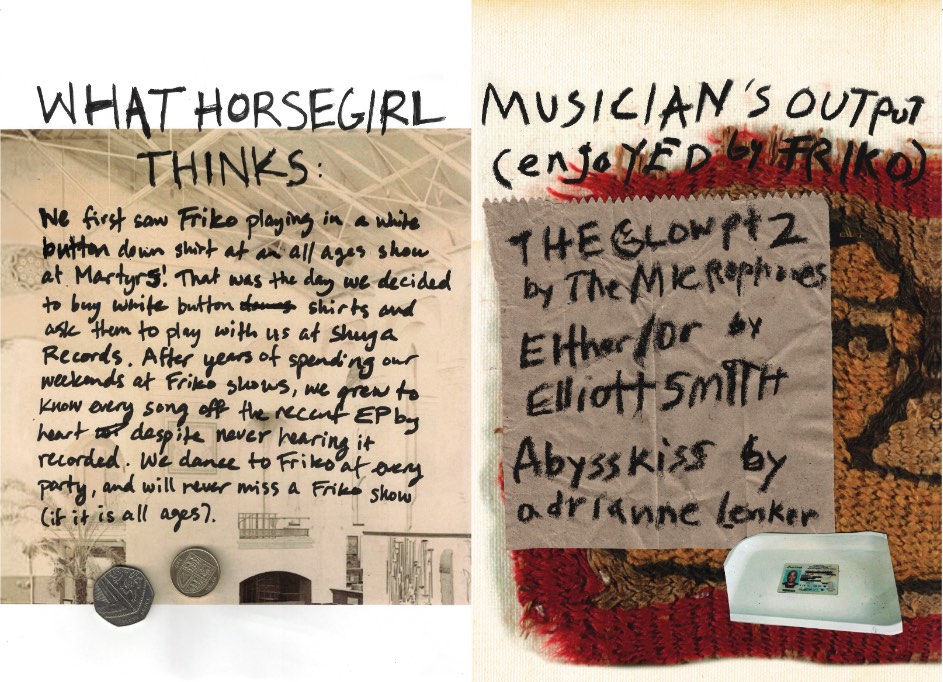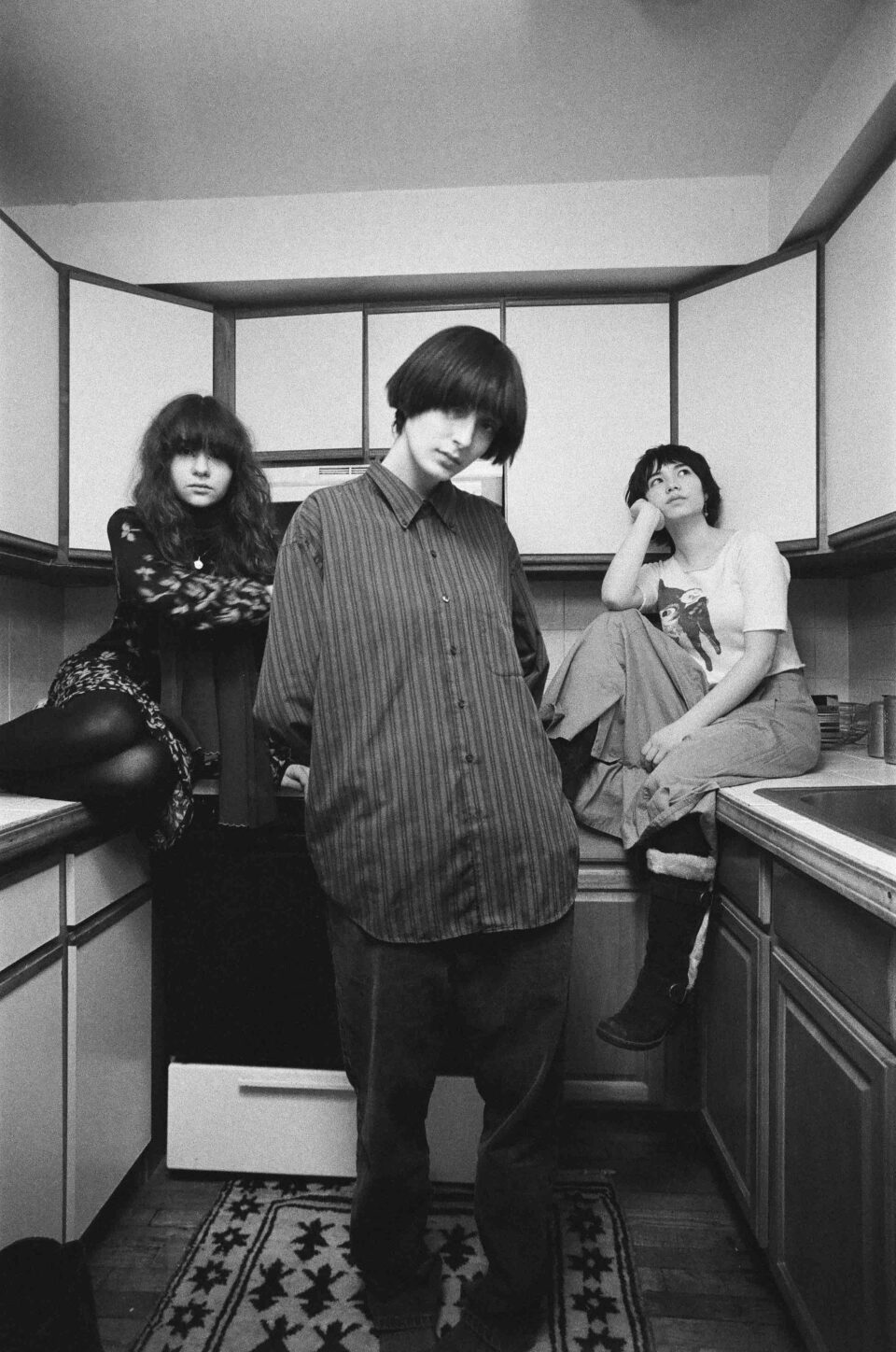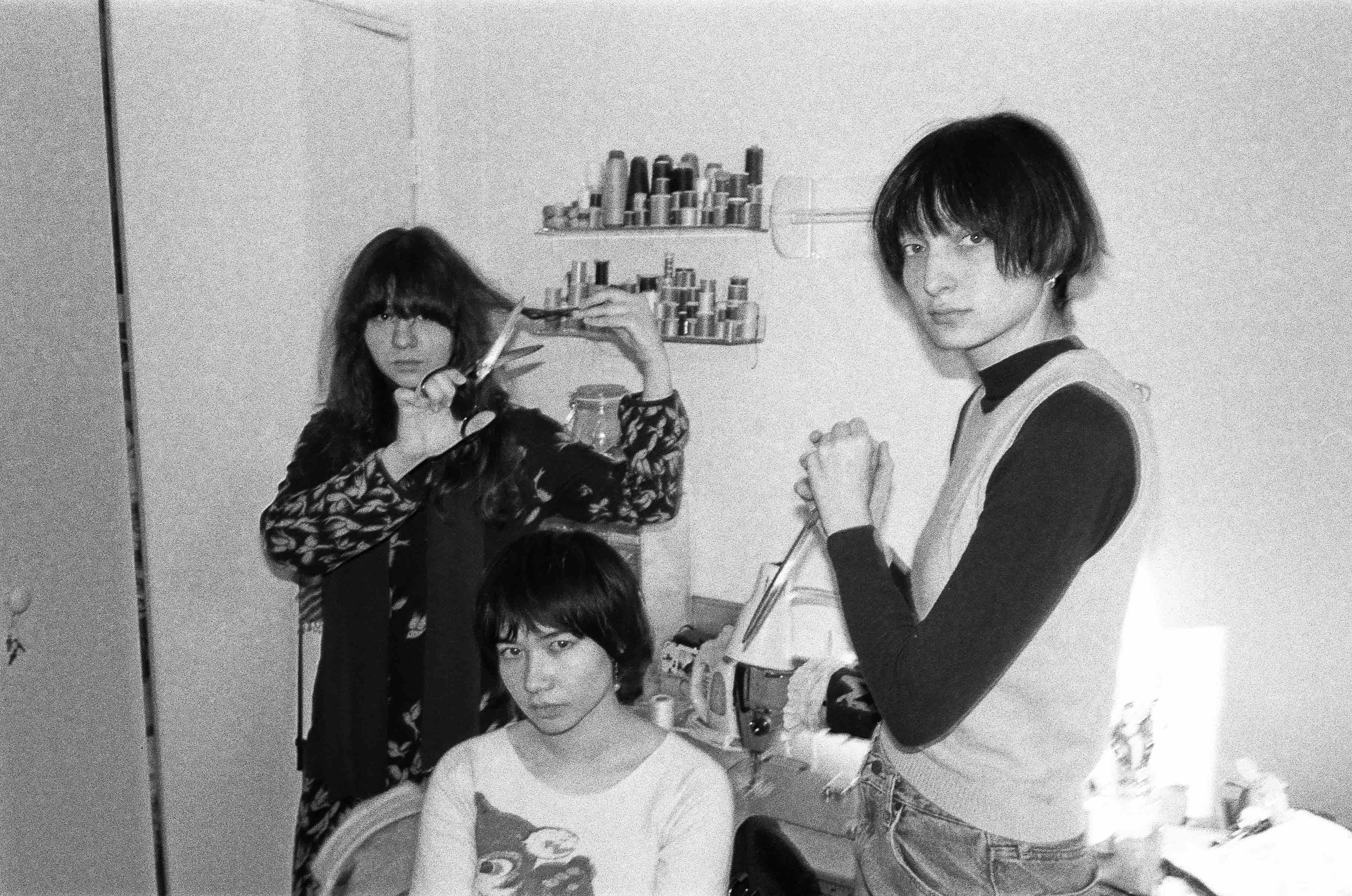Chicago trio Horsegirl’s debut record Versions of Modern Performance is garage rock collaged with punk, pop, and new wave. Members Nora Cheng, Penelope Lowenstein, and Gigi Reece, who met each other through the swelling network of Chicago youth arts programs, don’t just possess an unflinching chemistry, but they embellish and radiate the joys of collaboration and friendship. They celebrated the scene that produced them with their music video for “Dirtbag Transformation (Still Dirty)” by featuring members of other local bands, including Lifeguard, Friko, Dwaal Troupe, and Post Office Winter.
Despite inspiring a label bidding war, Horsegirl are DIY to the core. Along with filming their music videos themselves, they also created their album’s artwork. Since they started playing together, they’ve embraced their ’80s influences sonically and artistically, throwing their own flare into genre trademarks and making space at shows for zine distribution. The community they keep is affectionately referred to as a “mini-rock underground,” and Horsegirl taps into the home they’ve made there: their entire presentation is an alchemy of each member, as they embrace the raw, imperfect aesthetics championed by an ever-growing support system in Chicago.
On June 5, the day of Lowenstein’s high school graduation, Horsegirl celebrated their debut record with a release show at Chicago’s Thalia Hall. To match the synthesis of sounds on Versions, Cheng, Lowenstein, and Reece created their own zine to mark the milestone. When its surprise inclusion with all album pre-orders appeared to generate excitement, the band decided to gather visibility for the peers that have long inspired them by holding a zine sale at the release show—placing a priority on youth zines while also featuring their own.
In our conversation ahead of the gig that took place over the weekend, Cheng, Lowenstein, and Reece dive further into celebrating the creative work of the youth community in Chicago, and reckon with how the intersection of art and music has galvanized them as a band.
What’s the story behind this particular zine’s genesis? How did you three come to the decision to pair it with the album?
Gigi Reece: When we were thinking of some type of title for this grand event that is our album release show [where] we get to play with all of our friends again, we liked the idea of it being some type of recital, and we were like, “Oh, it can be like a recital pamphlet.” And, also, we like to sell zines at our shows and we had a moment of being like, “We’ve never actually made one and now’s the perfect time.”
At the record release show, you’ve made it a priority to distribute other artists’ zines alongside your own. How many zine submissions for the release show did you receive?
Penelope Lowenstein: So far we have 30. They’re all [made by] kids in Chicago, so a lot of them are people who haven’t made zines before. I also have a lot of friends who are like, “Oh, I’m making one for the show!” That kind of thing makes me really happy because I think it’s awesome that stuff like this would encourage people to want to contribute.
“The music we’re most excited about right now is being made by our friends. When your friends are playing good shows and making good music and making cool zines, you’ve got to keep up.”
— Penelope Lowenstein
Can you tell me about some of the zines you’ll be featuring at the show?
Lowenstein: Hallogallo is the biggest zine in Chicago. It’s interviews with musicians and a lot of coverage of fans in Chicago. I co-did an interview with Circuit Des Yeux and the person who runs Hallogallo. This is the main inspiration for everyone who’s making zines in Chicago who’s a kid. Mother Night is another friend of ours. I think that [zine] is going to be interviews with kids in Chicago.
Nora Cheng: Some people do their own comics or collage poetry.
Reece: It’s a nice way that people showcase their art.
Lowenstein: A lot of people who make different mediums of art and they’re compiling whatever they’re working on into a zine.

What’s your favorite spread in the Horsegirl zine?
Lowenstein: There’s a section called “Musical Output Enjoyed By” and then [insert band]. I think that’s really funny because all of the bands [playing the release show], we asked them to just send weird band merch they have. There’s some weird pics, if you look closely, and I think that’s a goofy thing I like to see from bands I’m a fan of.
Reece: When we made [the zine], we ran out of colors, so we were like, “Oh, what color do we make the Friko spread?” We made it black and white, and it looked surprisingly cool. So I feel proud of that one.
“I remember seeing the kids that made zines for one of our first shows and they were distributing them at that place. That’s when I was like, ‘Oh, this is something that cool kids are doing, it’s totally an awesome way to make art.’”
— Gigi Reese
Talk to me a bit about the network of youth arts programs in Chicago and your “mini-rock underground.”
Lowenstein: Since we’re all kids from Chicago, a lot of us have done some sort of music education at some point, but, also a lot of us have never been trained and just wanted to play an instrument. Throughout high school, we’ve slowly met more and more people who have similar musical ideas as us. The music we’re most excited about right now is being made by our friends. It definitely is the kind of environment that pushes you to want to make something cool. When your friends are playing good shows and making good music and making cool zines, you’ve got to keep up.
Reece: The music program gave us a good foundation of bonding through music. But then, as we got a bit older, and we were just going to shows with each other, talking about music that we found independently, that’s when we really started to find a lot more people that built this whole scene.
When was the first time you discovered zines as an artistic medium, and what pushed you to make some of your own?
Lowenstein: In eighth grade, I did a whole project about zines. There’s a zine institution very close to my elementary school called Quimby’s. I did a lot of my research on punk stuff because I was interested in that when I was about to leave middle school. I don’t know if I really picked up zine things again until more recently when our friends began making them.
Reece: I didn’t even really know what zines were. I understood the concepts and Penelope would talk to me about her and Nora’s zine. One of the earliest shows we played was, like, a zine party. I remember seeing the kids that made zines for that and they were selling them or distributing them at that place. That’s when I was like, “Oh, this is something that cool kids are doing, it’s totally an awesome way to make art.”
“There’s something cool about musicians having a whole distinct visual language associated with them. Especially in our scene, there’s people doing all of that stuff themselves in a way that’s pretty much their own, which is something really interesting.”
— Nora Cheng
Versions of Modern Performance, at times, sounds much like a zine reads. It’s collage-y and experimental, bold and texturized. Was there any intention of making the zine such a compatible companion to the record, or were you instead hoping to capture the visuals of the band’s aesthetic?
Cheng: That wasn’t an explicit thought, but we do all the visuals ourselves, and those, we feel, correspond to how the album sounds and they’re also very zine-y. The thing you said about collageiness is really interesting. I think that’s definitely something we are doing. We’re kind of putting together a bunch of our influences, but in a different sort of way, and trying to create something new from it.

What kind of relationship do you hope to see between musicians and art and literature in the future?
Lowenstein: So much of our experience with music has been obsessing over artists we love and scenes that we never got to participate in, because they happened 20 years ago. So I think we’ve always had this desire to participate in a music community that’s more than just listening to recorded music. We made the album cover ourselves completely—the back is all of our handwriting, the liner notes are completely handwritten. All of our music videos, except for the one professional one we did, are like…we called all of our friends up and did it in a friend’s house, [or] in my elementary school. We just want people to feel like the visuals were thought of by the band and the whole visual package is very cohesive, because that’s part of what’s fun for us as music fans and what we want to participate in as musicians.
Cheng: There’s something cool about musicians having a whole distinct visual language associated with them. A lot of music nowadays, a lot of different people get their hands on it, in all the different veins of it. There’s music videos, there’s visuals, there’s the general presentation. We think that, especially in our scene, there’s people doing all of that stuff themselves in a way that’s pretty much their own, which is something really interesting.
Penelope, I know that you’re graduating high school on the day of the release show. How are you feeling about that, going from one big moment to another one?
Lowenstein: I’m actually missing the graduation ceremony to do the show, which I’m not upset about at all. I would much rather be at the show. It’s all good. This is kind of an intense period of my life, because a lot of changes are happening, quite literally, within the same week or two. We’re leaving for our first European tour very shortly [after the release show] and then I’m moving into college. And we never expected to be having the opportunity to play Thalia or any of that. We’re just very excited. FL









